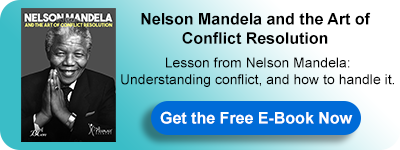Facts About Nelson Mandela
Through his work as a lawyer defending human rights, conscience prisoner, and the first-ever president elected democratically by true people in the history of free South Africa, Nelson Mandela became one of the most recognized peacemakers of our time. His values and dedication to the service of humanity inspire nations all over the world to the extent that Mandela's name, on itself, became more honorable than the awards and honorary degrees acquired from more than 50 universities worldwide.
His pursuit to change the world for the better was sincere and his ability to achieve that was inspiring. This included supporting and defending human rights; equality, gender equity, children rights, and powerless minorities; the fight against poverty; and standing up for social justice.
Facts about Nelson Mandela
- Nelson Mandela was born as Rolihlahla Dalibhunga Mandela. His school teacher has named him Nelson and sometimes called Madiba.
- Mandela earned a law degree from the University of South Africa in 1942 and is considered the world’s most famous political prisoner.
- In 1952, he became the leader of a resistance movement that used civil disobedience to condemn the unjust practices of apartheid in South Africa. He was arrested several times for his activism against the country's unjust system of racial segregation.
- In 1964, Nelson Mandela was sentenced to life in prison. Before his release in 1990, he served 27 years in that term.
- In 1993, Mandela shared the Nobel Peace Prize with his former adversary, president FW de Klerk, South Africa’s last apartheid leader. They won the Nobel Peace Prize for eliminating apartheid.
- In 1994, he became the first president of South Africa to be elected by a democratic election in which all South Africans were allowed to vote.
- Once he was finished with his presidency, he has established the Nelson Mandela Foundation in 1999 and focused on three work areas such as Nelson Mandela’s life and time, Social Justice Dialogue, and Nelson Mandela’s International Day.1
- In 2007, specifically on his 89th birthday, Nelson Mandela founded a group of independent global leaders and called them “The Elders” a mix of presidents, UN secretary generals, and Nobel Prize laureates, etc. and challenged them to “speak truth to power, raise the voices of the voiceless and offer hope where there is agony. ” Mandela said about this entity;2 Together we will work to support courage where there is a fear, foster agreement where there is conflict, and inspire hope where there is despair.
- He died at home on December 5, 2013, at the age of 95.
1Lisa Toole, December 13, 2013, borgenproject.org. Accessed 11 July, 2021, https://borgenproject.org/tag/nelson-mandela/page/4/
2Epic Work Epic Life, 5 Lessons Nelson Mandela Taught the World about Change, Accessed 11 July, 2021, https://epicworkepiclife.com/madiba-leadership/
For more about this topic, download our latest book "Nelson Mandela and the Art of Conflict Resolution " for FREE:
